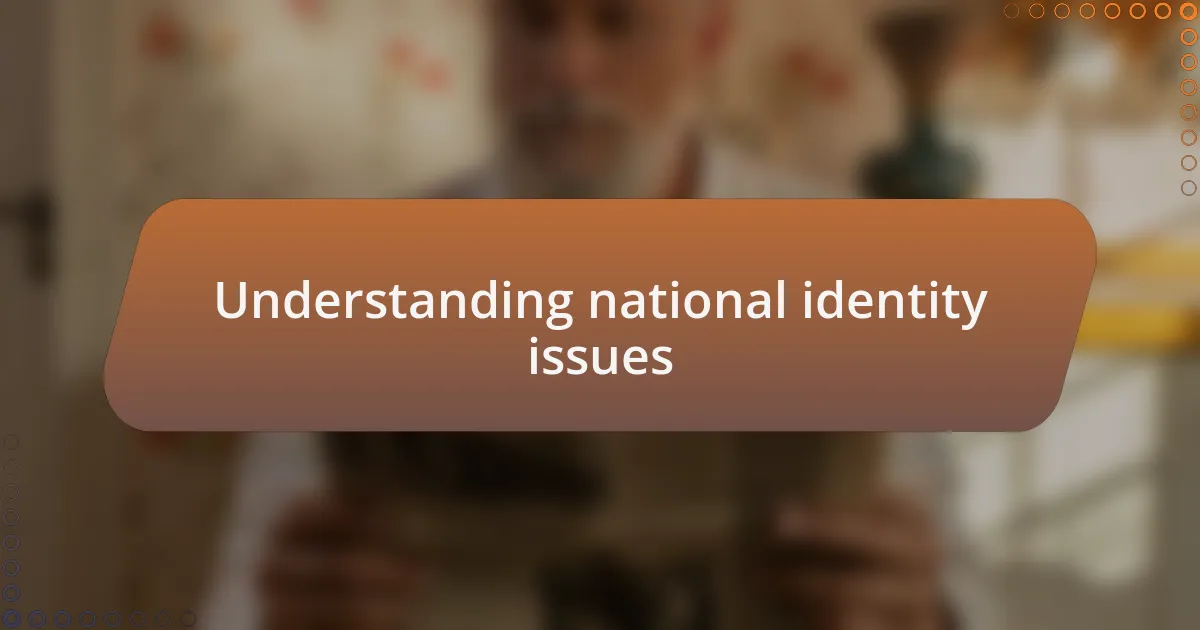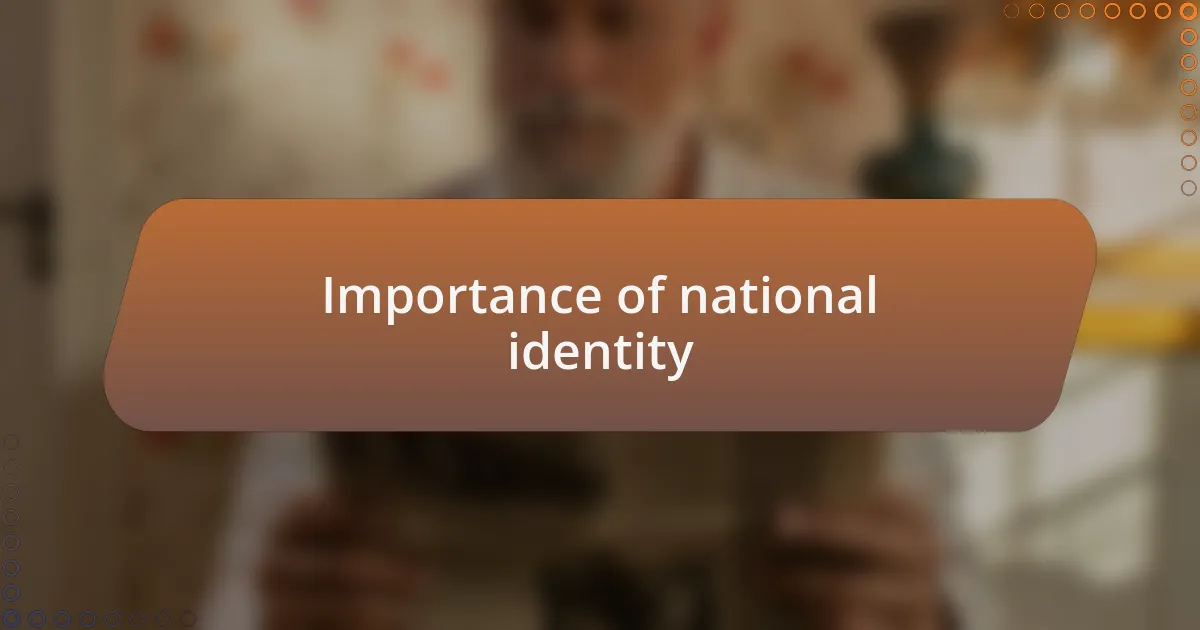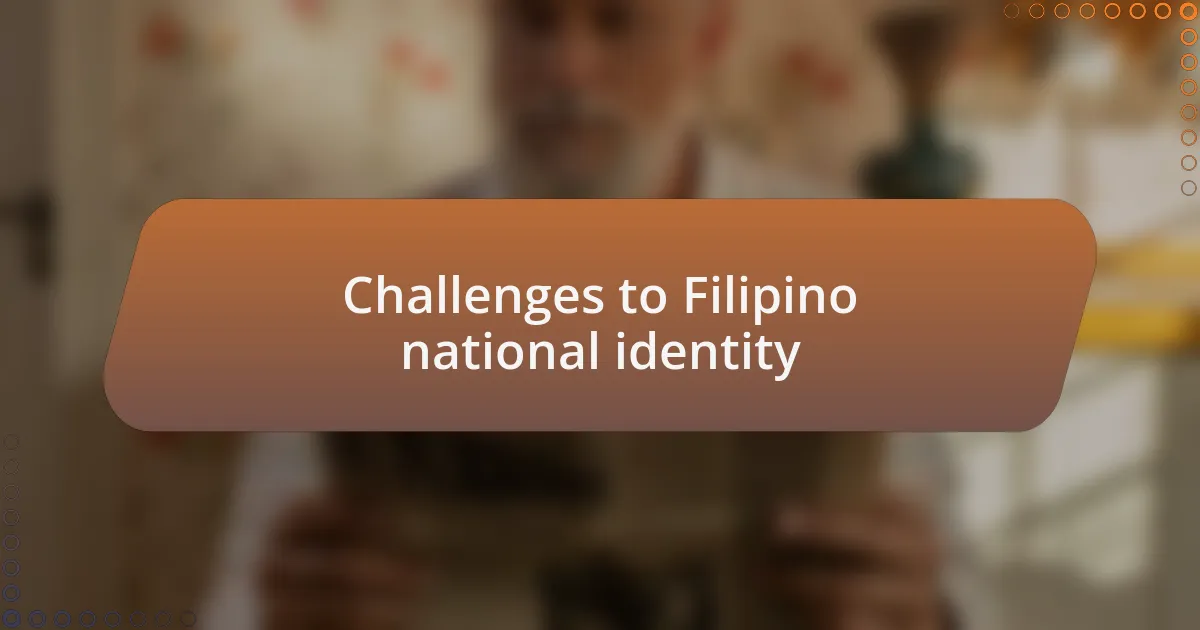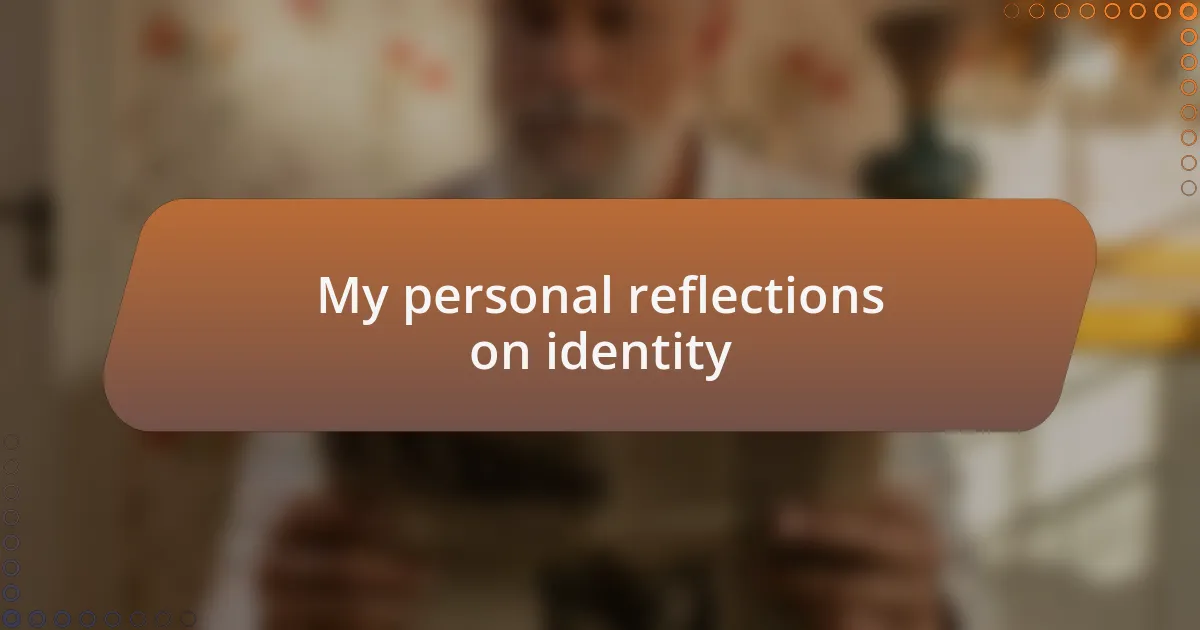Key takeaways:
- National identity issues involve balancing cultural heritage with contemporary influences and societal expectations.
- National identity fosters community cohesion, pride, and a stronger response to global challenges through shared values and history.
- Challenges to Filipino identity stem from globalization, diverse cultures, and historical events that shape perceptions of self.
- Personal experiences and community narratives play a crucial role in understanding and evolving individual and collective identities.

Understanding national identity issues
National identity issues are complex and often deeply personal. I remember a conversation I had with a friend who felt torn between embracing her Filipino heritage and adapting to a Western lifestyle. It made me reflect on how our identities can sometimes feel like a balancing act, where we weigh cultural pride against societal expectations.
As I delve into this topic, I often ponder: what does it truly mean to be Filipino in today’s globalized world? Is it solely about cultural practices, or does it extend to the values we uphold? From my experience, national identity is shaped by both history and personal narrative, leading to a tapestry of diverse perspectives that enrich our collective understanding.
Often, these issues arise from the tension between traditional customs and contemporary influences, creating a unique space for dialogue. The conversations I’ve had with family members about our ancestors’ struggles for identity during colonial times always resonate with me. They reveal the ongoing impact of history on our sense of self, reminding us that our national identity is a living construct, continually evolving and being redefined by each generation.

Importance of national identity
National identity serves as the backbone of a community, uniting individuals through shared values, history, and culture. Reflecting on my childhood, I recall attending family gatherings where stories of our ancestors were not just told; they were celebrated. Each tale forged a connection, deepening my understanding of who I am and where I come from. This sense of belonging can foster pride and empower individuals to uphold their cultural heritage.
Moreover, national identity plays a crucial role in shaping our worldview and responses to global challenges. I often wonder how our collective identity influences our stance on issues like climate change or social justice. In conversations with friends, I’ve noticed that knowing our origins can inspire us to advocate for matters that resonate with our cultural values. It’s fascinating how identity molds our actions and decisions, making our voices stronger when we speak on behalf of our nation.
Additionally, a robust national identity can bolster social cohesion, especially in a diverse society like the Philippines. I’ve experienced this firsthand during community events where people from various backgrounds come together, united under a common Filipino banner. These gatherings remind us that while we may differ in many ways, we share fundamental values that bind us together, fostering a sense of unity and purpose in our collective journey.

Challenges to Filipino national identity
Challenges to Filipino national identity can often emerge from the diverse cultures intermingling within our society. I remember a college class where we explored regional languages and dialects. Conversations sparked my curiosity about how languages shape our sense of self. Are we truly united when our vernaculars reflect different narratives? This complexity sometimes creates a rift, making it challenging to forge a collective identity.
Another challenge lies in the influence of globalization, where Western ideals and trends often overshadow our indigenous culture. I felt this acutely when traveling abroad, where many Filipinos I met struggled to connect with their roots. It raises a vital question: in a world captivated by external influences, how do we preserve the essence of being Filipino? This tension between adaptation and preservation can dilute our national identity if not addressed.
Moreover, historical events have left scars that affect how we perceive ourselves as a nation. I often think about the images from the Martial Law period that my parents shared. They spoke with a blend of fear and resilience, reminding me that our history shapes our identity. How do we learn from the past while moving forward? Engaging with these narratives could fortify our sense of identity, enabling us to embrace both our struggles and triumphs as a cohesive story of the Filipino spirit.

My personal reflections on identity
Reflecting on my own identity feels like peeling back layers of an onion—there’s always more to discover. I recall a time I visited a local festival where the blend of traditions was palpable. Seeing people from various backgrounds come together to celebrate their heritage, I couldn’t help but ponder, how much of our identity is influenced by these shared experiences? It struck me that these moments not only celebrate diversity but also highlight the connective threads that bind us all.
When I think about the influence of media, I remember binge-watching a popular show that portrayed Filipinos in a manner that felt distant from my reality. I found myself questioning, are these images truly representative of who we are? This disconnect drew me to seek out stories from my community, reminding me of the unique narratives we each carry that collectively narrate the Filipino experience. It’s fascinating, isn’t it, how media shapes our perception of identity and pushes us to reclaim our authentic selves?
A pivotal moment for me was during a family reunion where, amidst laughter and stories, I discovered that my grandparents had maintained distinct cultural practices despite years of urbanization. As they shared their experiences of adapting while holding onto traditions, I felt a deep sense of pride. Isn’t it remarkable how our roots can simultaneously ground us while allowing us to grow? These revelations led me to appreciate the richness of my background, reinforcing that identity is not static; it’s a living narrative that continues to evolve with each generation.